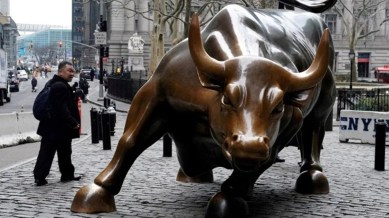Rattled by US and Japan, markets crash over 2.5% on global sell-off
The market capitalisation, or the total value of all listed shares, of the BSE-listed firms dropped by Rs 15 lakh crore to Rs 441.84 lakh crore on Monday, compared to Rs 457.16 lakh crore on August 2.

DOMESTIC STOCK market indices Sensex and Nifty crashed over 2.5 per cent — their biggest fall in two months — as fear of a recession in the US, the unwinding of Yen carry trades after the Bank of Japan hiked interest rate and geopolitical tensions in the Middle East rattled investors resulting in the selling of riskier assets.
The BSE’s 30-share Sensex plunged 2,222.55 points, or 2.74 per cent, to close at 78,759.40 and the Nifty 50 fell 2.68 per cent, or 662.1 points, to finish at 24,055.6. During the intraday trades, both indices declined over 3 per cent. This is the sharpest single-day fall since June 4, when Sensex and Nifty tanked 6 per cent after the Lok Sabha election results were announced.
The market capitalisation, or the total value of all listed shares, of the BSE-listed firms dropped by Rs 15 lakh crore to Rs 441.84 lakh crore on Monday, compared to Rs 457.16 lakh crore on August 2.
While foreign institutional investors (FIIs) offloaded Rs 10,073.75 crore worth of Indian equities, the domestic institutional investors (DIIs) bought Rs 9,155.55 crore, according to the exchange data.
Also, the rupee slumped 37 paise to settle at an all-time low of 84.09 against the US dollar on Monday following a sell-off in global markets.
Wall Street’s main indexes also slumped on Monday as risk appetite among investors dropped on fears of a US recession following weak economic data last week. Market worries eased a bit as the day progressed and stocks pared losses after data showed US services sector activity in July rebounded from a four-year low amid a rise in orders and employment, Reuters reported.
“A disappointing job scenario in the US coupled with the fear of a reverse Yen carry trade, following an interest rate hike in Japan, led Asian markets to plunge on Monday with Nikkei falling more than 12 per cent,” said Deepak Jasani, Head of Retail Research, HDFC Securities.
The unemployment rate in the US rose to 4.3 per cent in July, and nonfarm payroll employment edged up by 114,000, stoking fear of a deteriorating labour market and a possible recession in the economy.
“Beyond the headline miss in job gains and the unemployment rate, the household survey indicated a rise in job losses, typically a warning sign for a pending downturn. An unusual rise in temporary layoffs and evidence of a negative weather effect raise the possibility that the rise in job losses is just a blip, rather than the start of a worsening trend,” Nomura said in a report.
Last week, the US Federal Reserve kept the interest rates unchanged at 5.25-5.5 per cent and hinted at a rate cut in September.
Investors and analysts are debating about whether the Federal Reserve will need to accelerate its policy easing to support growth, Jasani said.
The Bank of Japan recently hiked its key interest rate to 0.25 per cent from 0.1 per cent, to check the fall in the Yen against the US currency.
“The unwinding of the great Japanese Yen carry trade is the talk of the town today and pushing financial markets lower,” said Apurva Sheth, Head of Market Perspectives and Research, SAMCO Securities. Carry trade is a trading strategy in which investors use a high-yielding currency to fund a transaction with a low-yielding currency.
The geopolitical tension in the Middle East was another factor that contributed to the fall in the market on Monday.
According to market experts, the fall in the market was mainly on account of global factors and the Indian economy continues to remain resilient. They said retail investors should not panic and worry about their investments.
“India’s economy and equity markets continue to be on a growth trajectory supported by strong corporate fundamentals despite some recent international events along with rising geopolitical risks. In my view, long term investors should not be deterred by such global uncertainties. The focus should remain on the broader investment horizon of 10-15 years, leveraging the solid fundamentals of the Indian economy and its companies,” said A Balasubramanian, MD & CEO, Aditya Birla Sun Life AMC Ltd.
The sell-off in the market was seen across the board, with all major indices ending in red. The Nifty Smallcap 100 dropped 4.57 per cent and Nifty Midcap 100 dipped 3.55 per cent. Sectoral indices Nifty Bank and Nifty Auto fell 2.45 per cent and 3.92 per cent, respectively.
Among the NSE firms, the companies that lost the most included Tata Motors (7.4 per cent), ONGC (6.39 per cent), Adani Ports and Special Economic Zone (5.92 per cent), Tata Steel (5.61 per cent) and Hindalco Industries (5.25 per cent).